Unit 4 How often do you exercise?|知识点
文档属性
| 名称 | Unit 4 How often do you exercise?|知识点 |
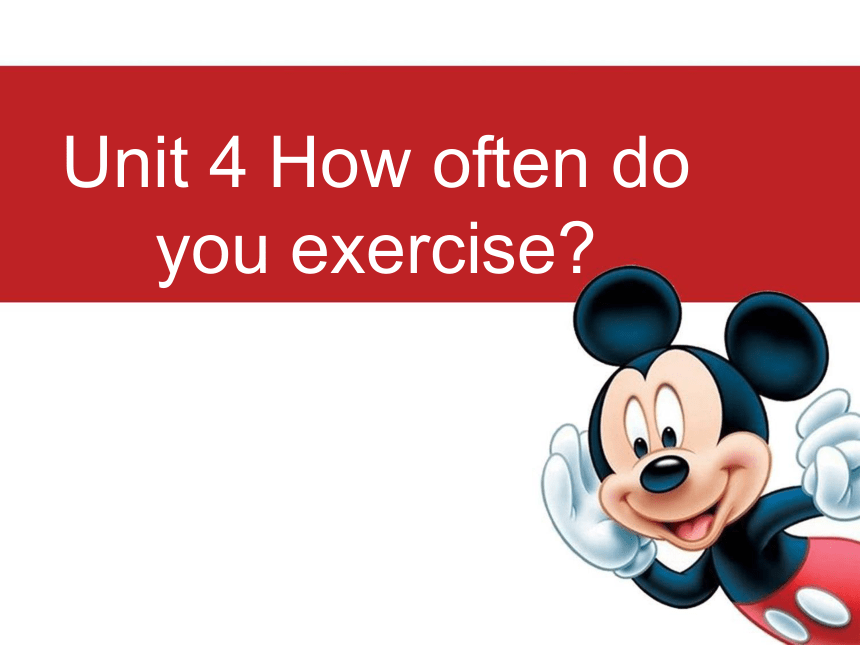
|
|
| 格式 | rar | ||
| 文件大小 | 195.9KB | ||
| 资源类型 | 教案 | ||
| 版本资源 | 鲁教版(五四学制) | ||
| 科目 | 英语 | ||
| 更新时间 | 2010-11-05 00:00:00 | ||
图片预览


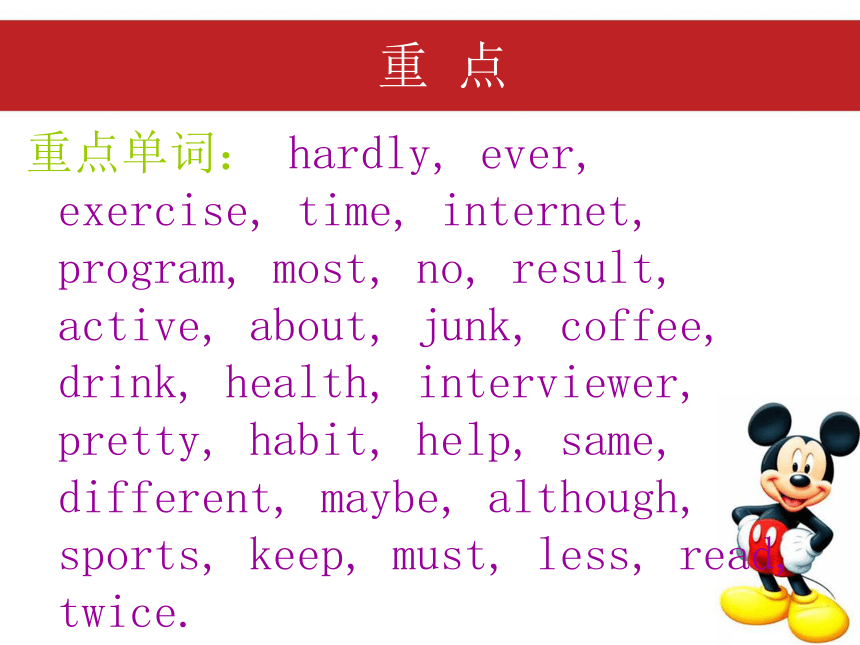
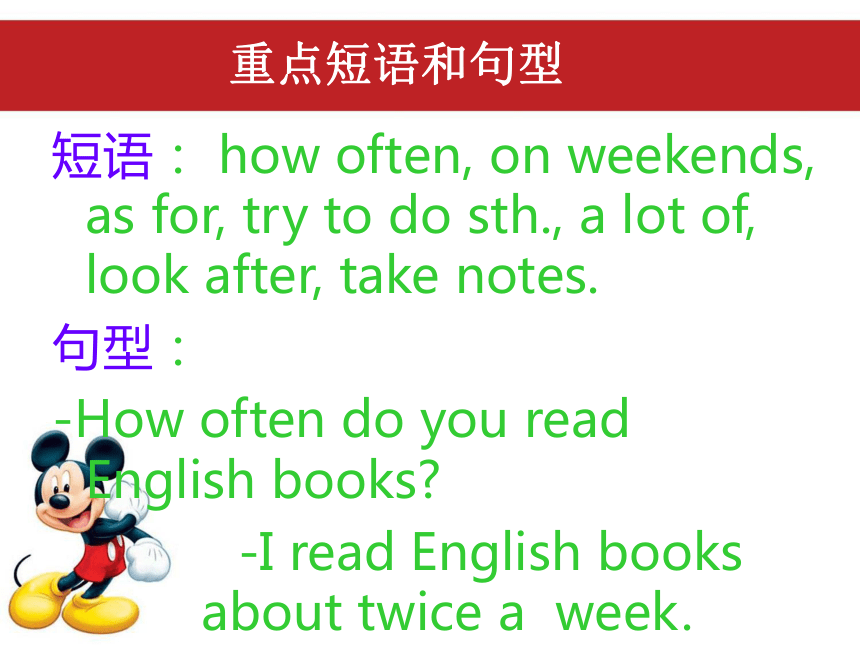
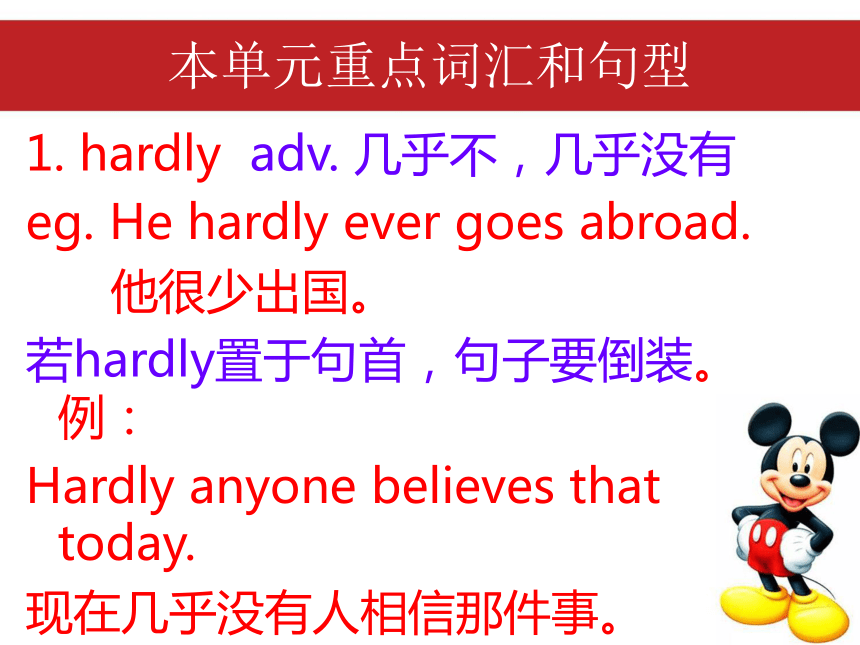

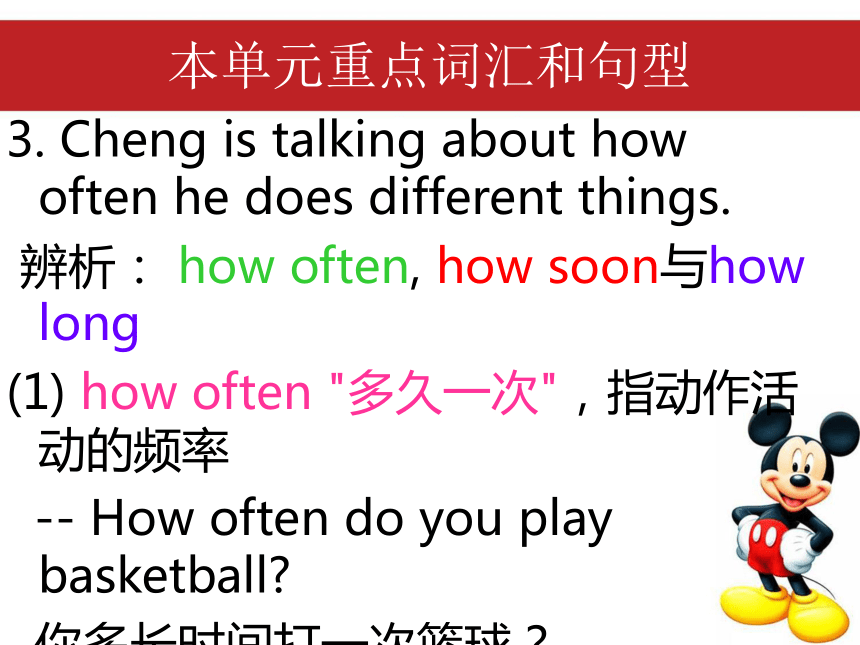
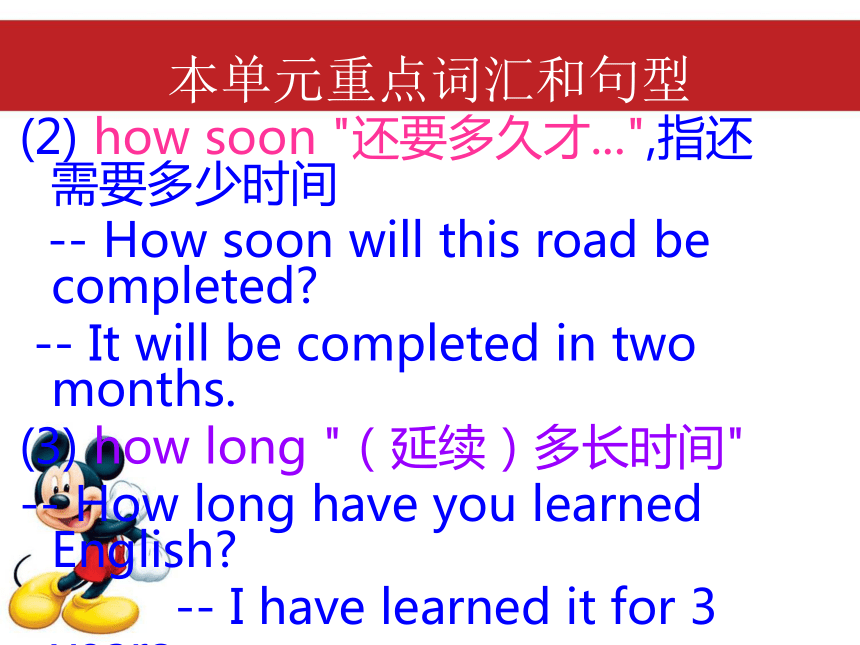
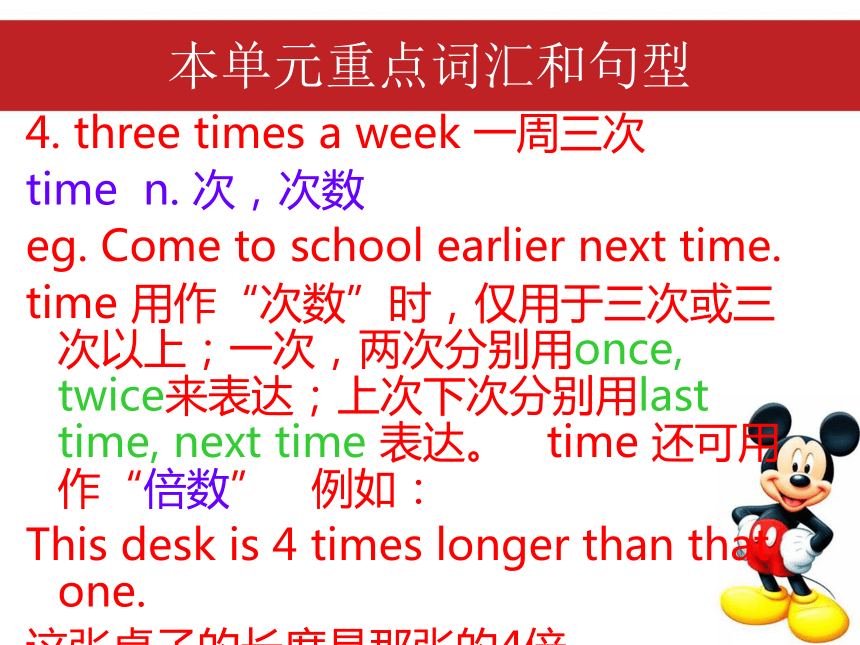
文档简介
课件24张PPT。Unit 4 How often do you exercise? Topic : Free time activities
Language goal: Talk about how often you do things 重 点重点单词: hardly, ever, exercise, time, internet, program, most, no, result, active, about, junk, coffee, drink, health, interviewer, pretty, habit, help, same, different, maybe, although, sports, keep, must, less, read, twice. 短语: how often, on weekends, as for, try to do sth., a lot of, look after, take notes.
句型:
-How often do you read English books?
-I read English books about twice a week.重点短语和句型本单元重点词汇和句型1. hardly adv. 几乎不,几乎没有
eg. He hardly ever goes abroad.
他很少出国。
若hardly置于句首,句子要倒装。 例:
Hardly anyone believes that today.
现在几乎没有人相信那件事。本单元重点词汇和句型2. ever adv. 曾经;在任何时候(=at any time)
Have you ever been to Hongkong?
你曾经去过香港吗?
It is raining harder than ever.
雨下得比以前任何时候都大了。本单元重点词汇和句型3. Cheng is talking about how often he does different things.
辨析: how often, how soon与how long
(1) how often "多久一次",指动作活动的频率
-- How often do you play basketball?
你多长时间打一次篮球?本单元重点词汇和句型(2) how soon "还要多久才...",指还需要多少时间
-- How soon will this road be completed?
-- It will be completed in two months.
(3) how long "(延续)多长时间"
-- How long have you learned English?
-- I have learned it for 3 years.本单元重点词汇和句型4. three times a week 一周三次
time n. 次,次数
eg. Come to school earlier next time.
time 用作“次数”时,仅用于三次或三次以上;一次,两次分别用once, twice来表达;上次下次分别用last time, next time 表达。 time 还可用作“倍数” 例如:
This desk is 4 times longer than that one.
这张桌子的长度是那张的4倍。本单元重点词汇和句型5. What's your favorite program?
program n. 节目,表演;(电脑)程序
The last TV program is very good.
最后的电视节目很好。
He wrote a program for that game.
他为那个游戏编写了一个程序。本单元重点词汇和句型6. Here are the results of the student activity survey. 这是学生活动调查的结果。
以here开头的句子有时需要倒装。主语是名词时,需要完全倒装,即谓语放在主语前;主语是代词时,则不需倒装。
eg. Here comes the bus! (名词主语)
Here she comes.(代词主语)本单元重点词汇和句型7. Some students are active, and exercise every day.
active adj. 积极的,活跃的;主动的
eg. He is an active member of the club.
他是俱乐部的积极分子。
反义词: passive adj.消极的,被动的本单元重点词汇和句型8. As for homework, most students do homework every day.
as for “关于,至于” 例如:
I enjoy swimming. But as for my sister,she enjoys playing tennis.
我喜欢游泳。但至于我妹妹,她喜欢打网球。本单元重点词汇和句型9. junk food 垃圾食品
junk n.废弃物,破烂
junk food 垃圾食品
junk mail 垃圾邮件本单元重点词汇和句型10. Milk is good for your health.
牛奶有益于健康。
health n.健康,健康状况
Smoking is bad for your health.
in good health 身体健康
in poor health 身体不健康本单元重点词汇和句型11. ...but I'm pretty healthy. 但是我相当健康。
pretty adv. 非常,相当。用来修饰形容词或副词,表示程度。
eg. The boy is pretty smart.那男孩儿相当聪明。
adj. 漂亮的
eg. The girl is pretty.那女孩儿很漂亮 12. My eating habits are pretty good.
我的饮食习惯相当好。
habit n.习惯,习性
be in/ have the habit of 有...的习惯
eg. He's not in the habit of drinking a lot.本单元重点词汇和句型本单元重点词汇和句型 13. I try to eat a lot of vegetables.
try to do sth. 设法/尽力做某事
eg. He tries to finish his work within two hours.
他尽力在两小时内完成这项工作。
try doing sth. 尝试做某事
He tries swimming this afternoon. 14. look after 照看,照顾,照料
eg. Please look after my baby.
look for 寻找 look at 看
look like 看起来像 look into 调查
look up 查找(词汇)本单元重点词汇和句型 15. Good food and exercise help me to keep healthy. 好的事物和锻炼使我保持健康。
help sb. (to) do sth. help sb. with sth. 帮助某人做某事
eg. You can help him (to)repair the car.
I help Tom with his English.
can't help doing sth. 禁不住做某事
He can't help crying at the bad news.
听到那个坏消息,他禁不住哭了。
本单元重点词汇和句型本单元重点词汇和句型 16. Is her lifestyle the same as yours or different?
the same as 与...相同
Her hair is the same color as her mother's.
be different from 与...不同
His pen is different from mine. 17.Then ask three classmates the question and take notes.
take/make notes 记下,做记录
eg. The teacher asked us to take notes in the lesson.
compare notes with sb. 与某人交换意见。本单元重点词汇和句型本单元重点词汇和句型 18. What are the differences? 有何不同?
difference n. 不同,差异,区别
Can you tell me the difference between them?
你能说出他们的不同吗?
There is no difference which train
you catch.
你坐哪班火车没有区别。 本单元重点词汇和句型Thanks for watching!
Language goal: Talk about how often you do things 重 点重点单词: hardly, ever, exercise, time, internet, program, most, no, result, active, about, junk, coffee, drink, health, interviewer, pretty, habit, help, same, different, maybe, although, sports, keep, must, less, read, twice. 短语: how often, on weekends, as for, try to do sth., a lot of, look after, take notes.
句型:
-How often do you read English books?
-I read English books about twice a week.重点短语和句型本单元重点词汇和句型1. hardly adv. 几乎不,几乎没有
eg. He hardly ever goes abroad.
他很少出国。
若hardly置于句首,句子要倒装。 例:
Hardly anyone believes that today.
现在几乎没有人相信那件事。本单元重点词汇和句型2. ever adv. 曾经;在任何时候(=at any time)
Have you ever been to Hongkong?
你曾经去过香港吗?
It is raining harder than ever.
雨下得比以前任何时候都大了。本单元重点词汇和句型3. Cheng is talking about how often he does different things.
辨析: how often, how soon与how long
(1) how often "多久一次",指动作活动的频率
-- How often do you play basketball?
你多长时间打一次篮球?本单元重点词汇和句型(2) how soon "还要多久才...",指还需要多少时间
-- How soon will this road be completed?
-- It will be completed in two months.
(3) how long "(延续)多长时间"
-- How long have you learned English?
-- I have learned it for 3 years.本单元重点词汇和句型4. three times a week 一周三次
time n. 次,次数
eg. Come to school earlier next time.
time 用作“次数”时,仅用于三次或三次以上;一次,两次分别用once, twice来表达;上次下次分别用last time, next time 表达。 time 还可用作“倍数” 例如:
This desk is 4 times longer than that one.
这张桌子的长度是那张的4倍。本单元重点词汇和句型5. What's your favorite program?
program n. 节目,表演;(电脑)程序
The last TV program is very good.
最后的电视节目很好。
He wrote a program for that game.
他为那个游戏编写了一个程序。本单元重点词汇和句型6. Here are the results of the student activity survey. 这是学生活动调查的结果。
以here开头的句子有时需要倒装。主语是名词时,需要完全倒装,即谓语放在主语前;主语是代词时,则不需倒装。
eg. Here comes the bus! (名词主语)
Here she comes.(代词主语)本单元重点词汇和句型7. Some students are active, and exercise every day.
active adj. 积极的,活跃的;主动的
eg. He is an active member of the club.
他是俱乐部的积极分子。
反义词: passive adj.消极的,被动的本单元重点词汇和句型8. As for homework, most students do homework every day.
as for “关于,至于” 例如:
I enjoy swimming. But as for my sister,she enjoys playing tennis.
我喜欢游泳。但至于我妹妹,她喜欢打网球。本单元重点词汇和句型9. junk food 垃圾食品
junk n.废弃物,破烂
junk food 垃圾食品
junk mail 垃圾邮件本单元重点词汇和句型10. Milk is good for your health.
牛奶有益于健康。
health n.健康,健康状况
Smoking is bad for your health.
in good health 身体健康
in poor health 身体不健康本单元重点词汇和句型11. ...but I'm pretty healthy. 但是我相当健康。
pretty adv. 非常,相当。用来修饰形容词或副词,表示程度。
eg. The boy is pretty smart.那男孩儿相当聪明。
adj. 漂亮的
eg. The girl is pretty.那女孩儿很漂亮 12. My eating habits are pretty good.
我的饮食习惯相当好。
habit n.习惯,习性
be in/ have the habit of 有...的习惯
eg. He's not in the habit of drinking a lot.本单元重点词汇和句型本单元重点词汇和句型 13. I try to eat a lot of vegetables.
try to do sth. 设法/尽力做某事
eg. He tries to finish his work within two hours.
他尽力在两小时内完成这项工作。
try doing sth. 尝试做某事
He tries swimming this afternoon. 14. look after 照看,照顾,照料
eg. Please look after my baby.
look for 寻找 look at 看
look like 看起来像 look into 调查
look up 查找(词汇)本单元重点词汇和句型 15. Good food and exercise help me to keep healthy. 好的事物和锻炼使我保持健康。
help sb. (to) do sth. help sb. with sth. 帮助某人做某事
eg. You can help him (to)repair the car.
I help Tom with his English.
can't help doing sth. 禁不住做某事
He can't help crying at the bad news.
听到那个坏消息,他禁不住哭了。
本单元重点词汇和句型本单元重点词汇和句型 16. Is her lifestyle the same as yours or different?
the same as 与...相同
Her hair is the same color as her mother's.
be different from 与...不同
His pen is different from mine. 17.Then ask three classmates the question and take notes.
take/make notes 记下,做记录
eg. The teacher asked us to take notes in the lesson.
compare notes with sb. 与某人交换意见。本单元重点词汇和句型本单元重点词汇和句型 18. What are the differences? 有何不同?
difference n. 不同,差异,区别
Can you tell me the difference between them?
你能说出他们的不同吗?
There is no difference which train
you catch.
你坐哪班火车没有区别。 本单元重点词汇和句型Thanks for watching!
同课章节目录
- Unit 1 What does he look like?
- Section A
- Section B
- Unit 2 I'd like some noodles.
- Section A
- Section B
- Unit 3 How was your school trip?
- Section A
- Section B
- Unit 4 What did you do last weekend?
- Section A
- Section B
- Unit 5 Where did you go on vacation?
- Section A
- Section B
- Unit 6 How often do you exercise?
- Section A
- Section B
- Unit 7 I'm more outgoing than my sister.
- Section A
- Section B
- Unit 8 What's the best movie theater?
- Section A
- Section B
